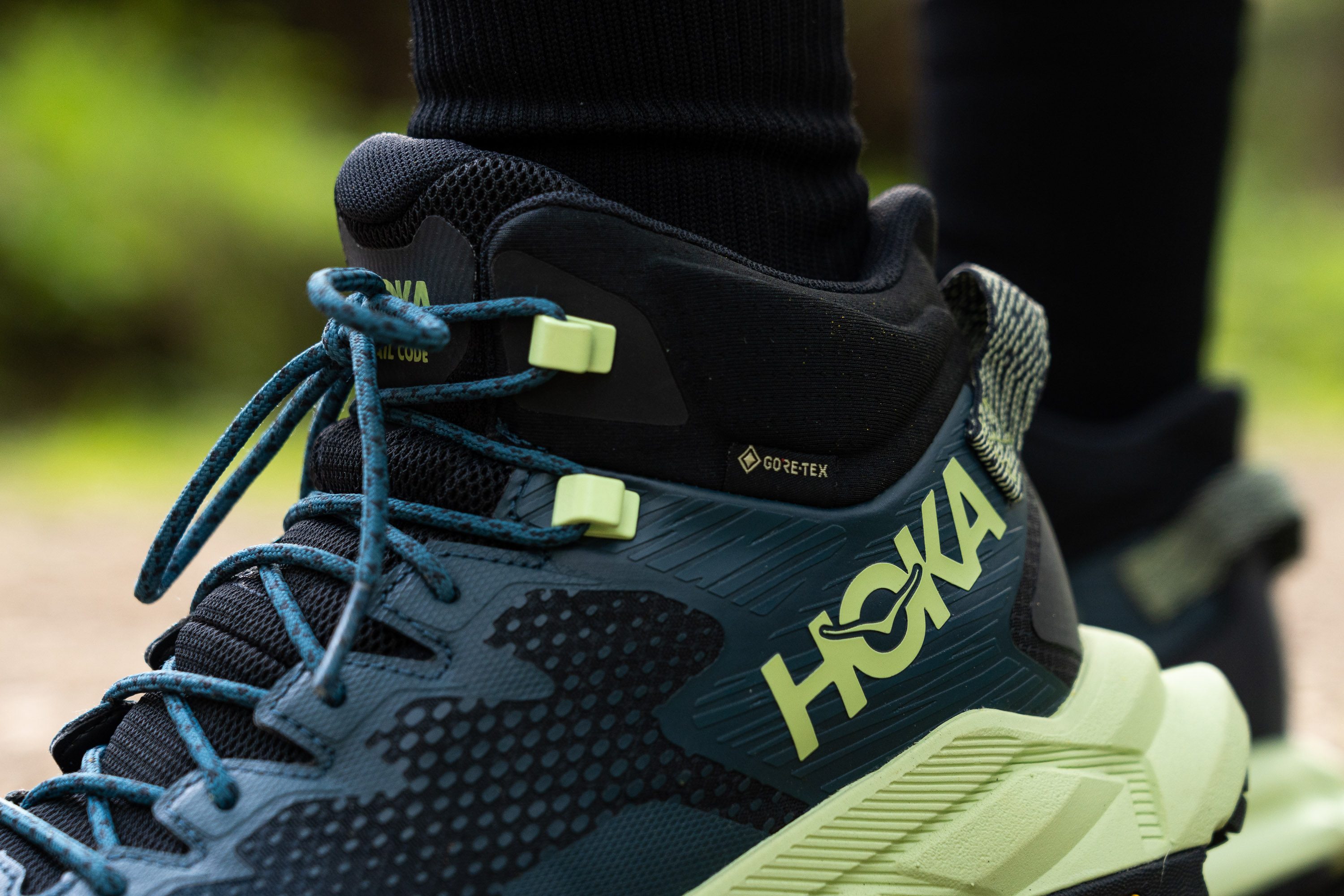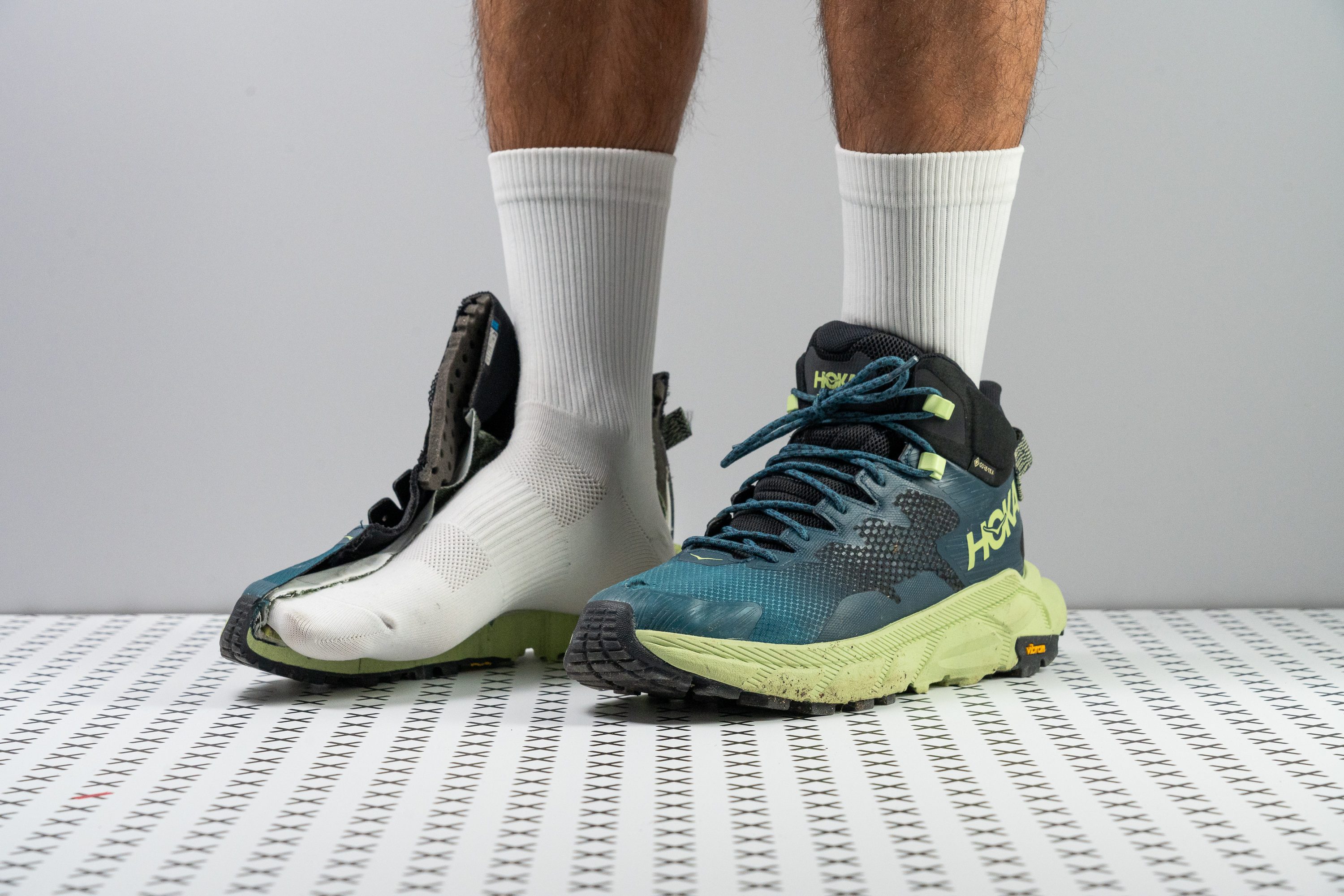Our verdict
- Top pick in best boots for light hiking (2023)
Pros
- Mind-blowingly comfortable
- Fantastic waterproofing
- Lighter than average
- Excellent impact protection
- Very stable and supportive
- Superb grip
- Reflective elements
- Sustainable materials
- Head-turning looks
Cons
- Awkward on descents
- Not for tough hikes
Audience verdict
Comparison
The most similar hiking boots compared
+ + Add a shoe | |||||
|---|---|---|---|---|---|
| Audience score | 82 Good! | 83 Good! | 79 Decent! | 85 Great! | |
| Price | £160 | £150 | £160 | £170 | |
| Trail terrain | ModerateTechnical | Moderate | LightModerate | Moderate | |
| Shock absorption | High | Moderate | High | - | |
| Energy return | Moderate | Moderate | Moderate | - | |
| Weight lab Weight brand | 15.5 oz / 440g 15.3 oz / 434g | 17.5 oz / 495g 13.6 oz / 385g | 17.4 oz / 494g 18 oz / 510g | 18.2 oz / 515g 17.4 oz / 493g | |
| Lightweight | ✓ | ✓ | ✓ | ✗ | |
| Breathability | Warm | Warm | Warm | Warm | |
| Use | Day HikingLight HikingSnow | Day HikingLight HikingSnow | Day HikingSpeed HikingLight HikingSnow | BackpackingDay HikingLight Hiking | |
| Orthotic friendly | ✓ | ✓ | ✓ | ✓ | |
| Drop lab | 11.2 mm | 13.5 mm | 9.0 mm | 12.9 mm | |
| Size | True to size | Half size small | True to size | True to size | |
| Midsole softness | Soft | Firm | Balanced | Firm | |
| Difference in midsole softness in cold | Normal | Small | Normal | Small | |
| Heel counter stiffness | Stiff | Moderate | Flexible | Flexible | |
| Stiffness | Flexible | Moderate | Moderate | Moderate | |
| Outsole hardness | Average | Average | Average | Soft | |
| Waterproofing | Waterproof | Waterproof | Waterproof | Waterproof | |
| Material | Textile | MeshSuede | LeatherTextile | Leather | |
| Season | Winter | Winter | Winter | Winter | |
| Toebox durability | - | Bad | Bad | Good | |
| Heel padding durability | - | Good | Bad | Decent | |
| Outsole durability | - | Bad | Decent | Bad | |
| Width / fit | Narrow | Medium | Medium | Wide | |
| Toebox width | Narrow | Medium | Narrow | Wide | |
| Lug depth | 4.7 mm | 5.0 mm | 5.0 mm | 4.2 mm | |
| Heel stack lab | 36.9 mm | 36.1 mm | 34.4 mm | 31.1 mm | |
| Forefoot | 25.7 mm | 22.6 mm | 25.4 mm | 18.2 mm | |
| Widths available | Normal | NormalWide | NormalWide | NormalWide | |
| Technology | Gore-TexVibram | Gore-Tex | Gore-TexVibram | Ortholite | |
| Cut | Mid cut | Mid cut | Mid cut | Mid cut | |
| Removable insole | ✓ | ✓ | ✓ | ✓ | |
| Ranking | #33 Bottom 19% | #30 Bottom 26% | #38 Bottom 7% | #24 Bottom 41% | |
| Popularity | #24 Bottom 41% | #11 Top 27% | #12 Top 30% | #30 Bottom 26% |
Who should buy
We believe that the Hoka Trail Code GTX is an excellent boot for hikers who:
- want a lightweight alternative to the burly hiking boots (it is 4.8 oz/135g lighter than average!)
- look for an excellent value for money (the Trail Code GTX is £20 cheaper than average)
- enjoy a very plush and cosy in-boot feel
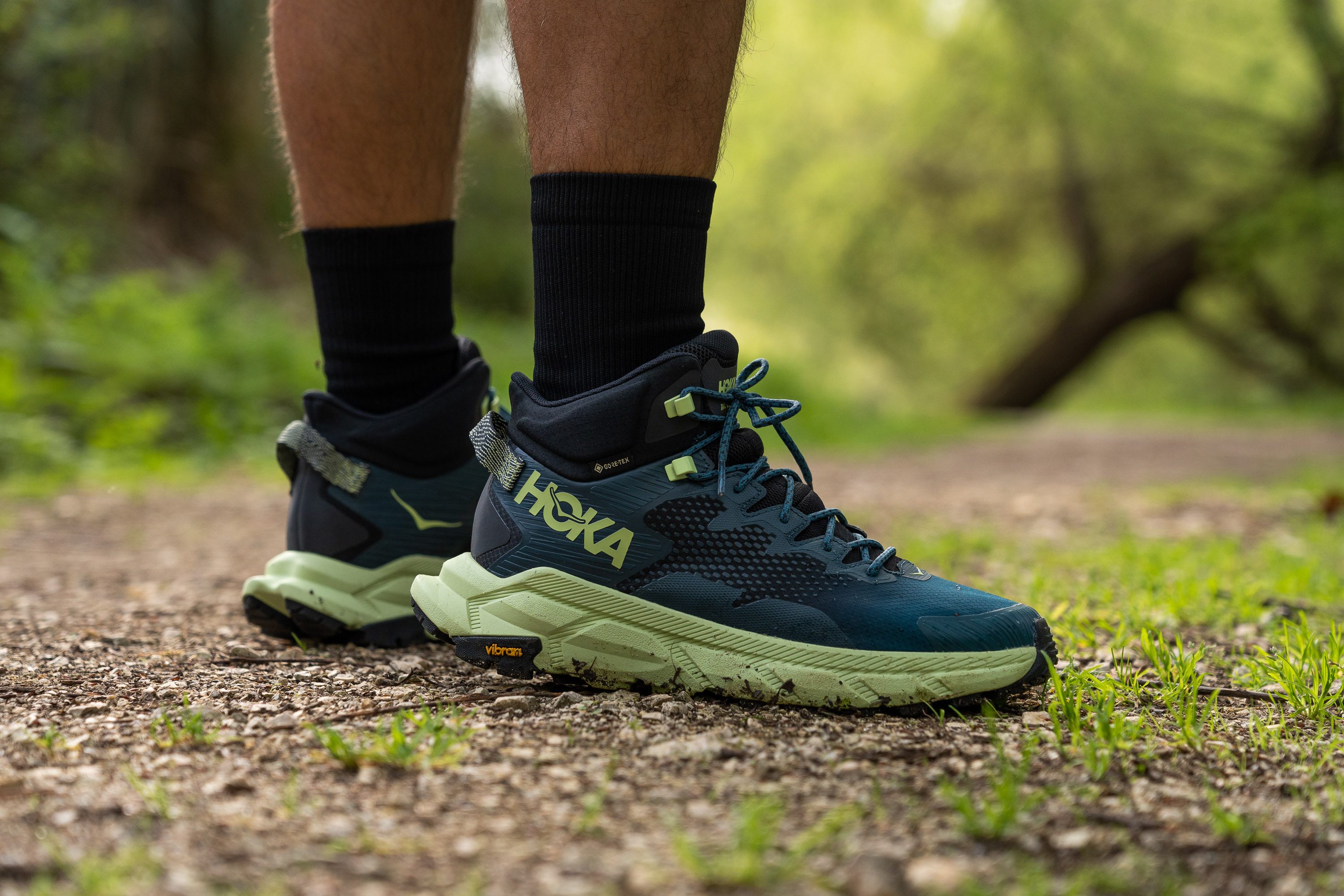
Who should NOT buy
The Hubble heel of this Hoka boot may not be for everyone. If you want a more streamlined silhouette that doesn't catch rocks and debris, we recommend the Salomon X Ultra 4 Mid GTX instead.
The Trail Code GTX is also not the best pick for backpacking, demanding terrain, or extreme weather conditions. For that purpose, the Hoka Kaha 2 GTX proved to be a much more reliable option.
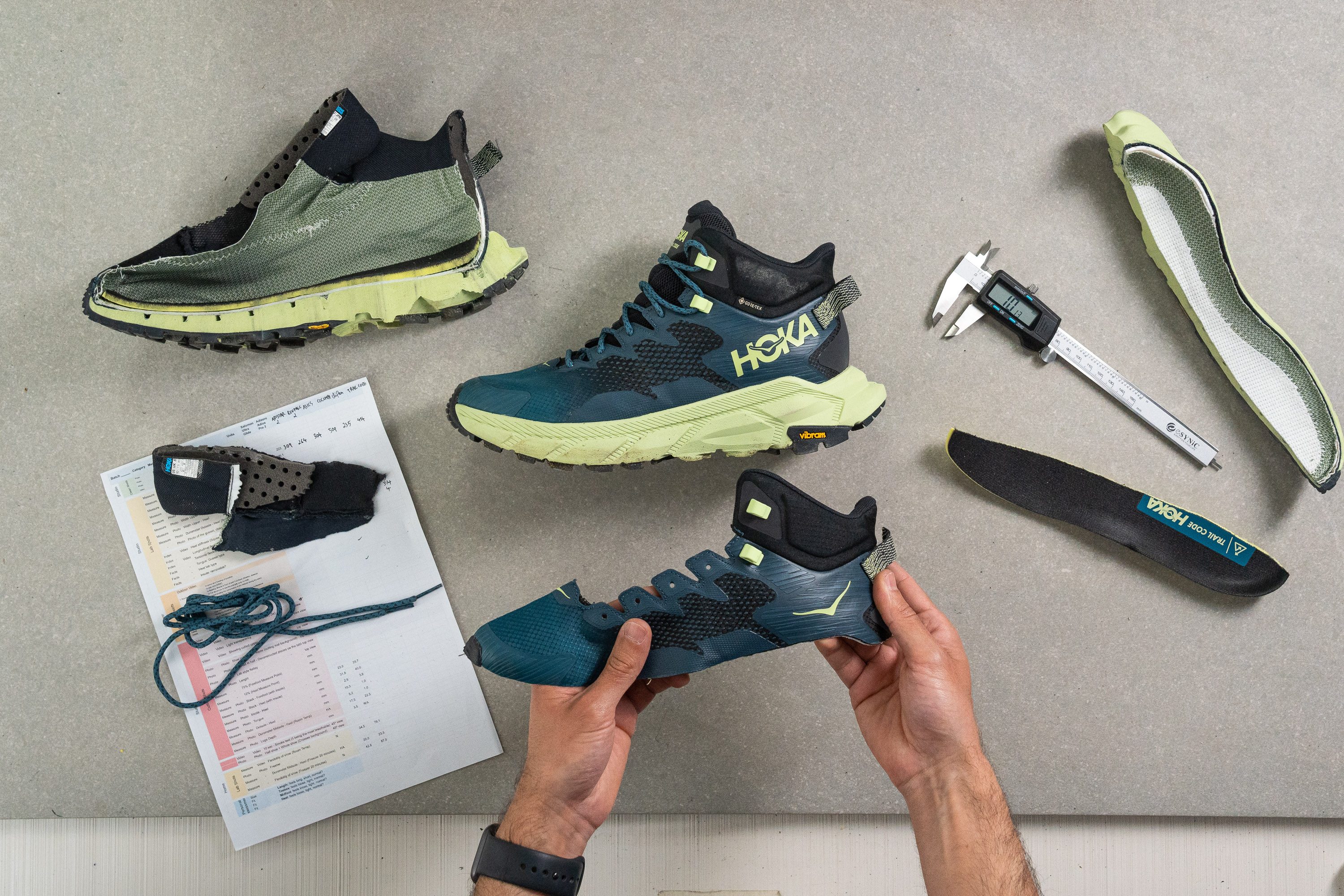
Cushioning
Shock absorption
The Trail Code GTX proved to be some of the most comfortable, cushioned, and fatigue-fighting hiking boots in our lab!
With an exceptionally high shock absorption measurement of 120 SA, it attenuates impact forces and mutes out debris to keep your feet cosy and protected. We can highly recommend it to people with joint concerns looking for a boot that would take good care of their ankles, knees, and hips.
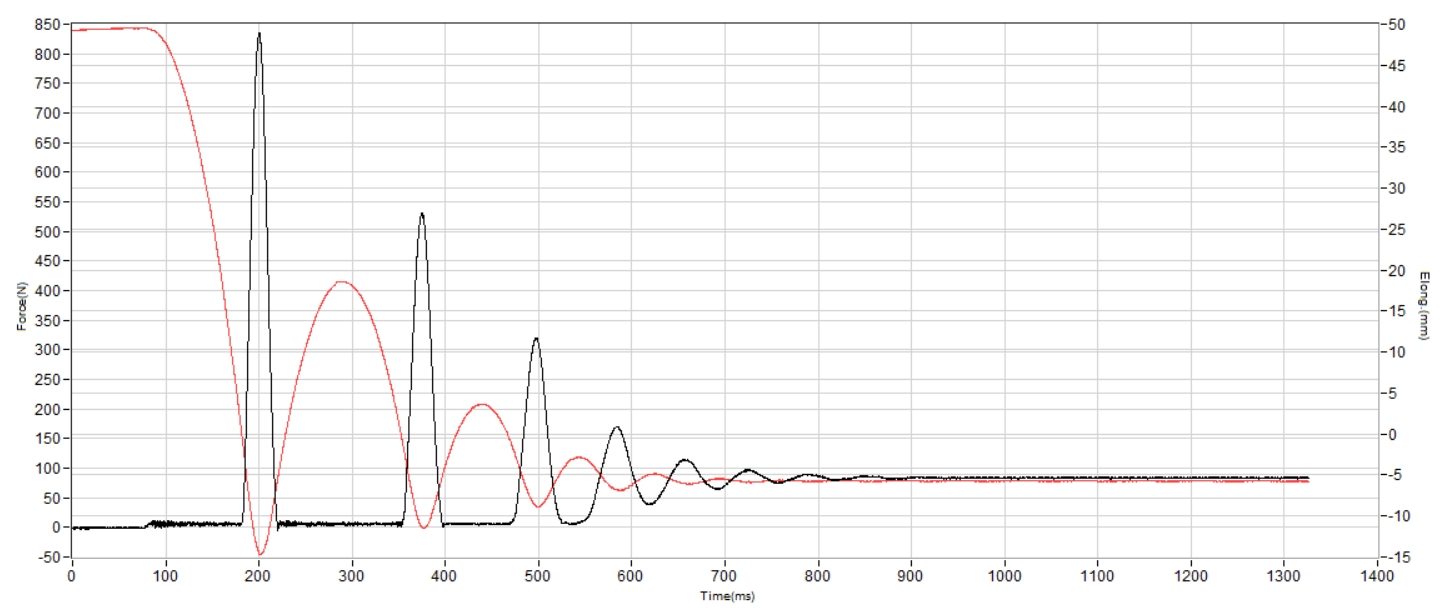
| Hoka Trail Code GTX | 120 SA |
| Average | 93 SA |
Energy return
This HOKA boot is not particularly responsive with a below-average energy return of 47%. But we can't complain about the lack of bounce in this boot because that's what makes the Trail Code GTX even more stable and planted.
| Hoka Trail Code GTX | 47.0% |
| Average | 50.5% |
Heel stack
Our calliper shows that the boot's stack height is 36.9 mm in the heel. That's a pretty standard amount of midsole for this type of hiking footwear.
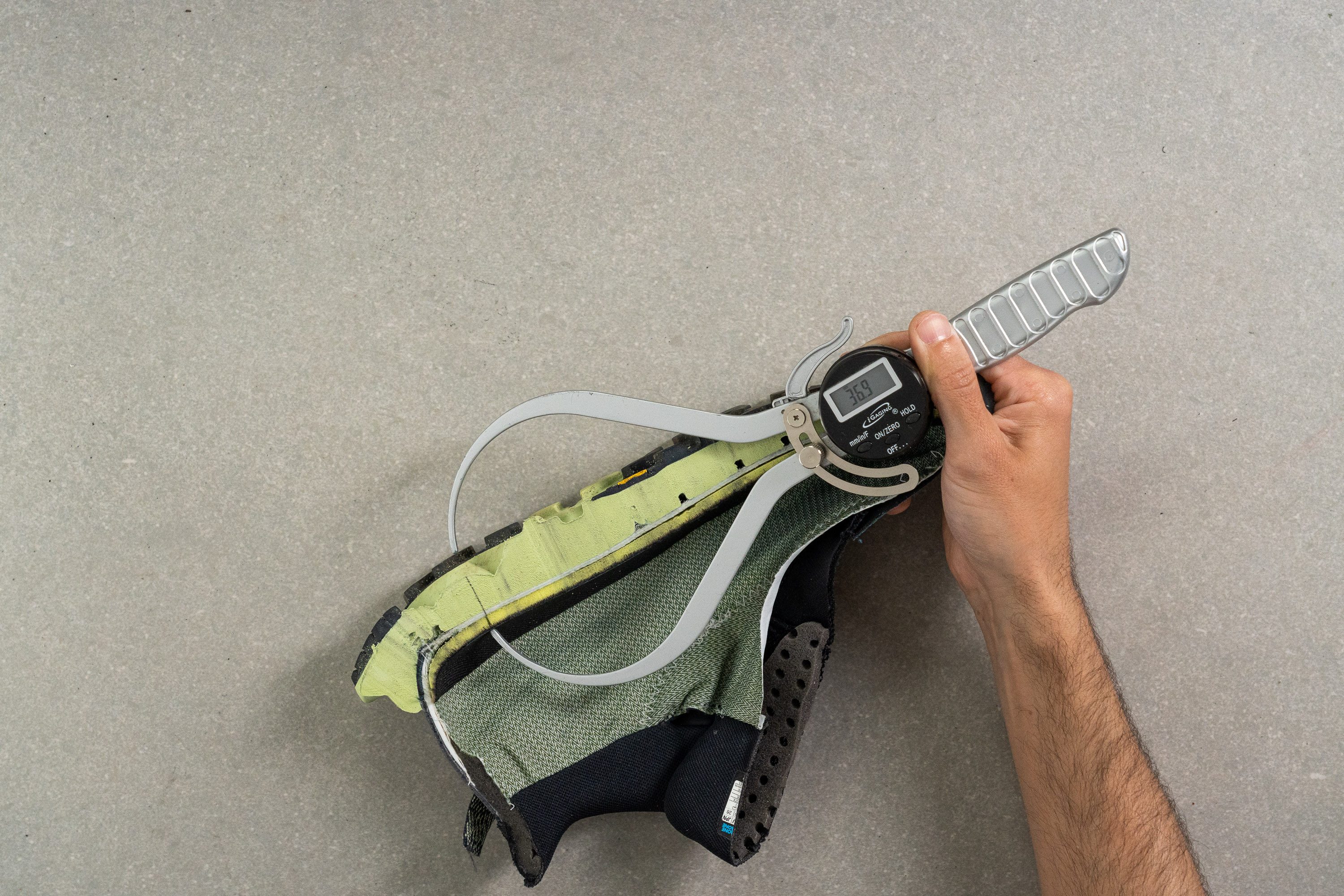
But there is more. The boot features the brand's renowned Hubble heel which makes the midsole more extended at the back.
From our experience, it makes landings a bit more stable and helps with smoother heel-to-toe transitions. The only problem is that it tends to get stuck in rocks and roots, especially when going downhill. But that's not an issue on the less technical trails.
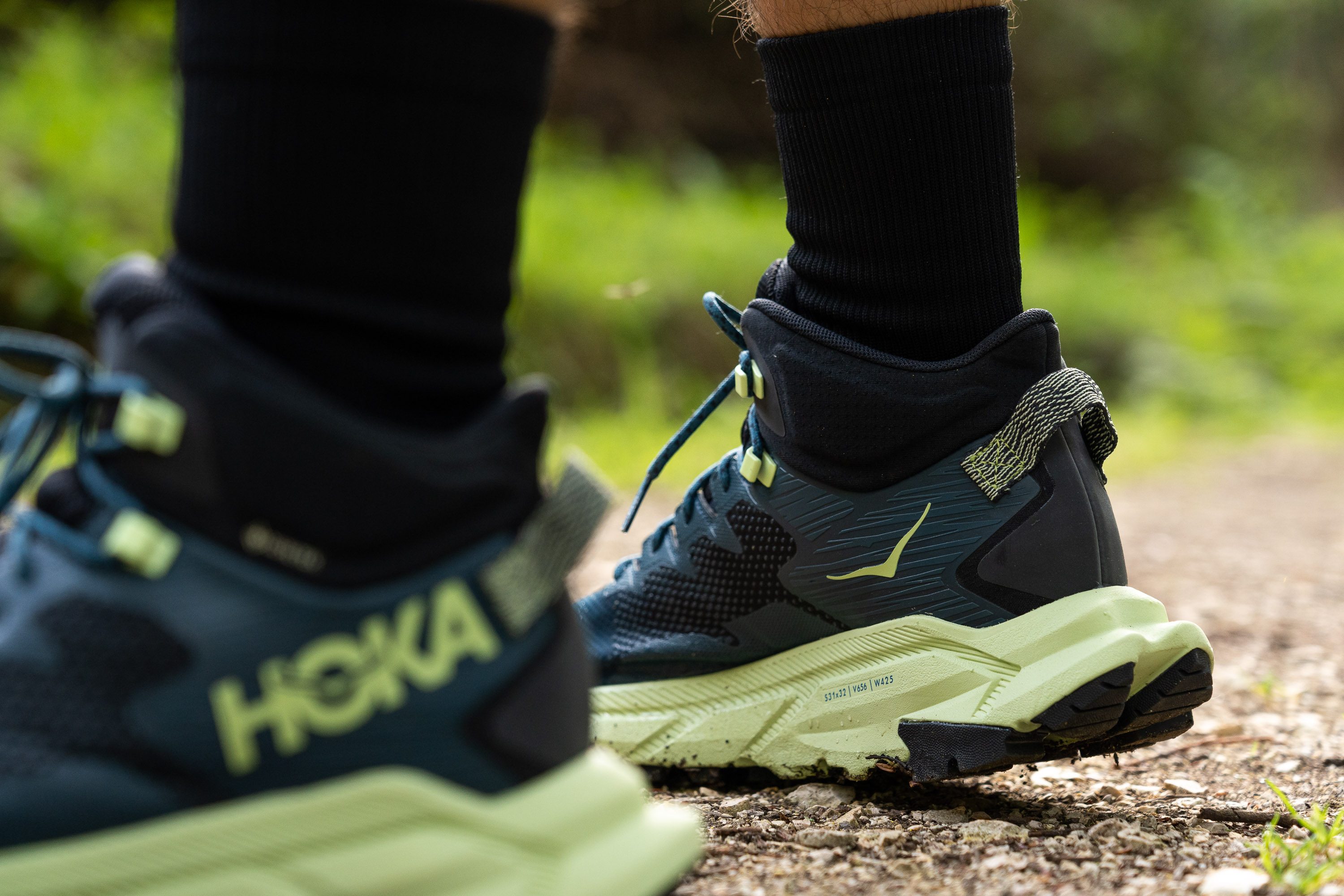
| Hoka Trail Code GTX | 36.9 mm |
| Average | 36.3 mm |
Forefoot stack
We also found that the boot remains generously cushioned in the forefoot as well.
At 25.7 mm, it is a little thicker than average.
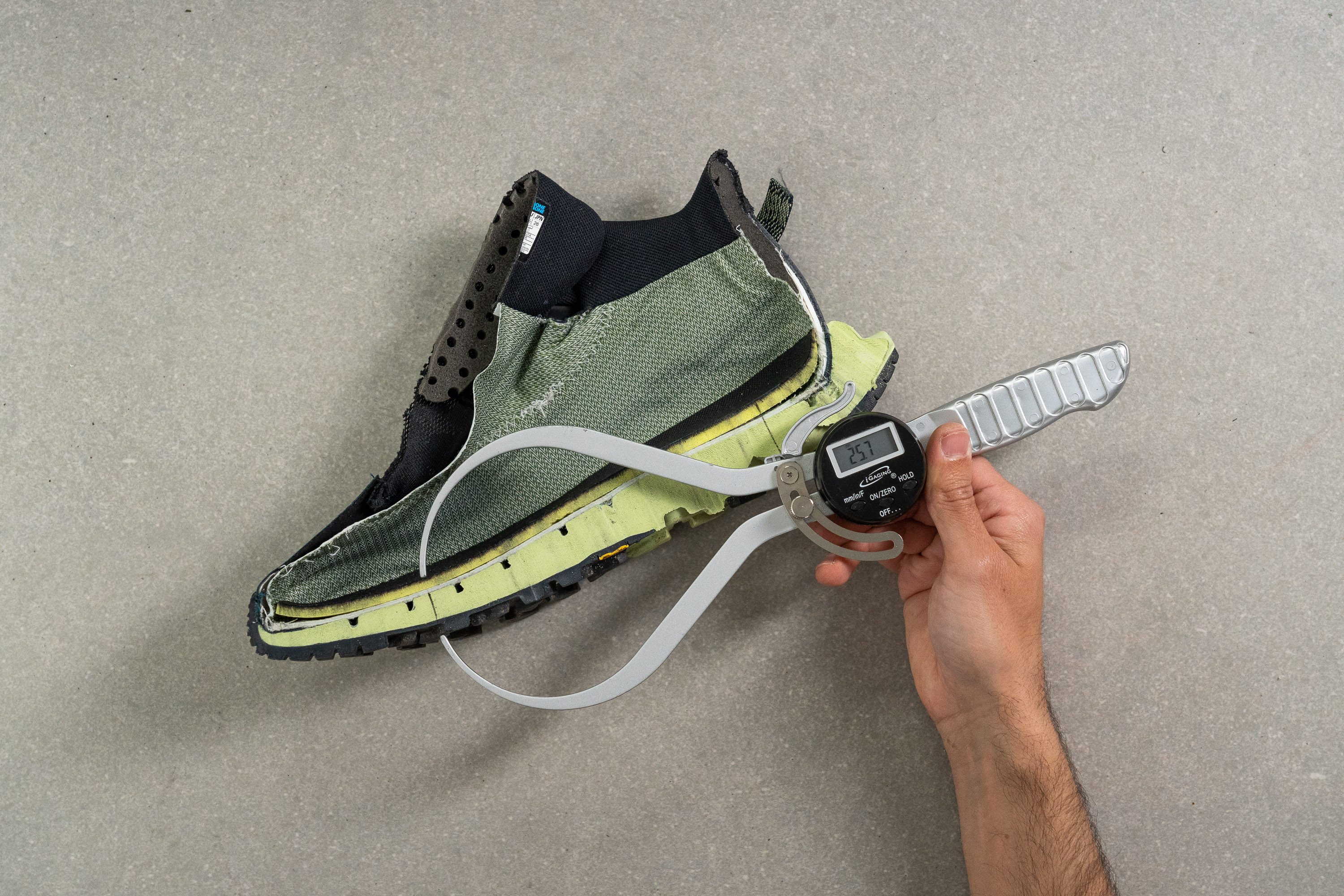
| Hoka Trail Code GTX | 25.7 mm |
| Average | 23.0 mm |
Drop
Hoka claims that the heel-to-to-toe drop in the Trail Code GTX is 6 mm. But based on our own measurements, it turns out to be much higher - 11.2 mm!
That's a pretty big difference if you expect a lower drop.
A 6-mm offset makes you feel like the heel and toes are nearly on the same level whereas an 11-mm drop has a very pronounced heel elevation. The latter is actually not a bad thing. Most hiking boots have a drop of 10-12 mm, which is optimal for feeling well-cushioned as you land on the heel.
It only becomes a problem if you expect that lower-drop feel based on the brand's description.
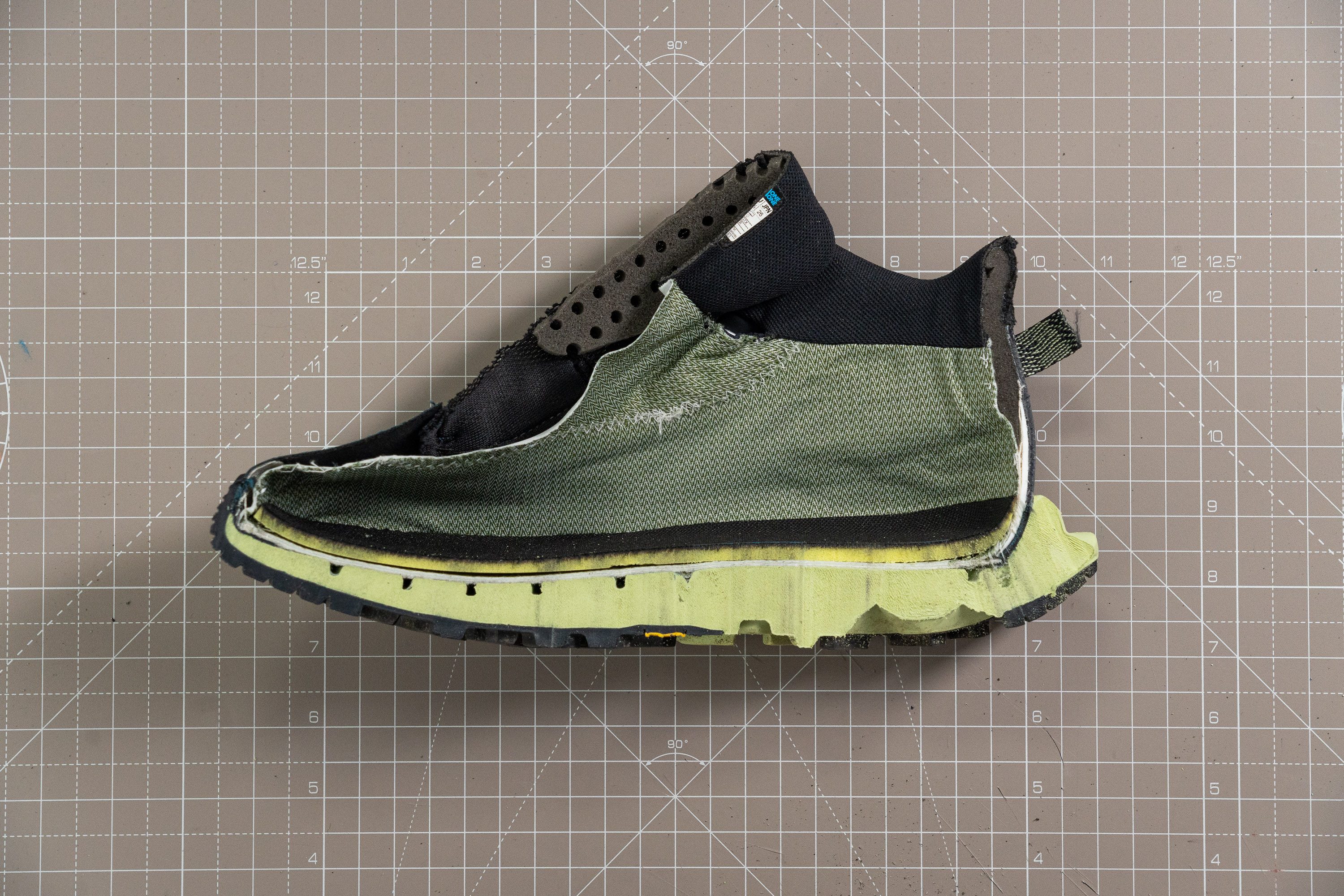
| Hoka Trail Code GTX | 11.2 mm |
| Average | 13.3 mm |
Midsole softness
Each landing feels amazingly soft in the Hoka Trail Code GTX. Even though the brand tags the shoe's cushioning as "balanced," we actually found it to be on the soft side.
Pressing a durometer against the foam, we got a reading of 23.4 HA. That's 20% softer than our lab-tested hiking boots on average.
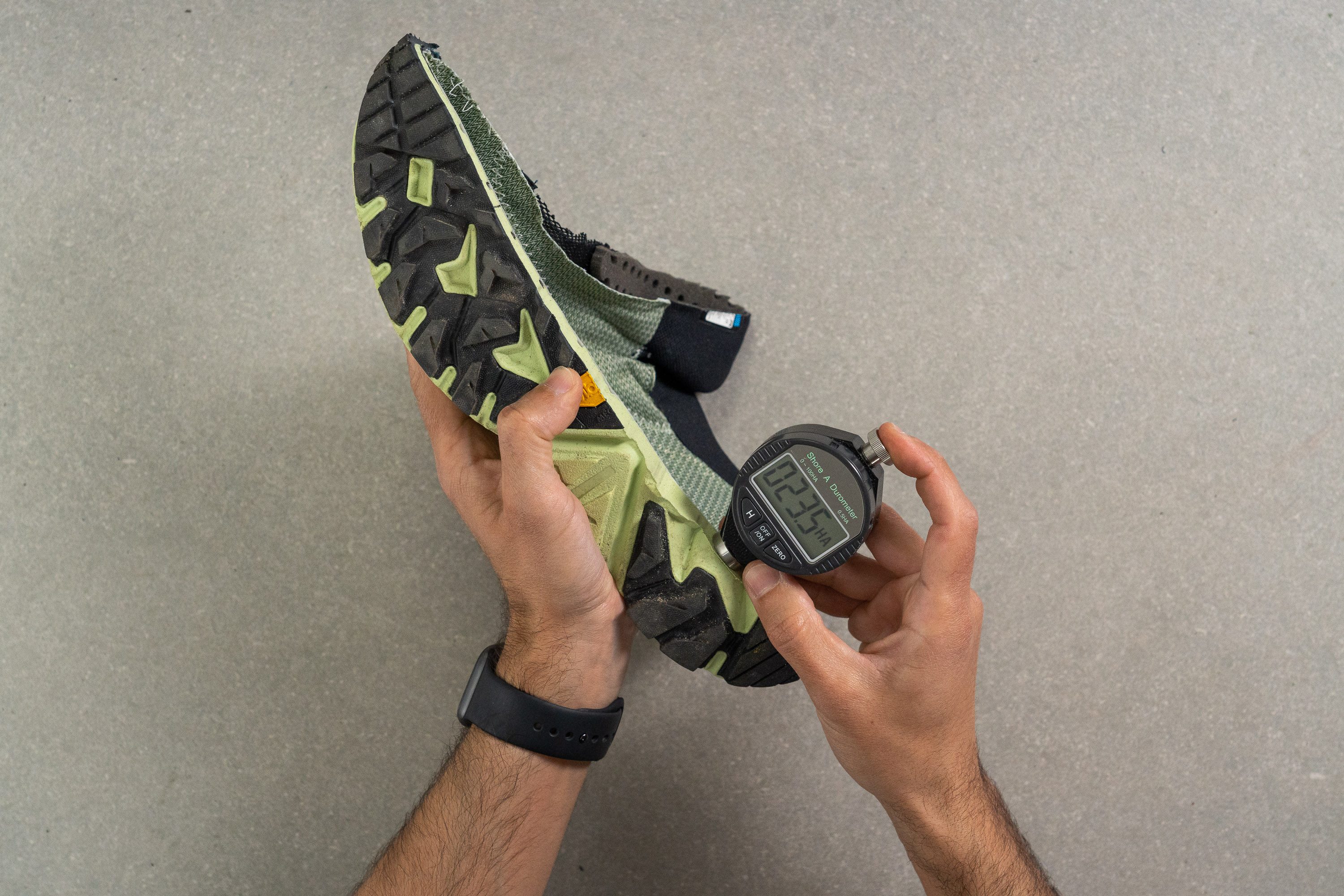
The platform remained marvellously comfortable throughout our test hike. Our feet also experienced a pleasant aftertaste once the boots were off. This is a perfect boot for all-day hikes, making those a little more effortless.
| Hoka Trail Code GTX | 23.4 HA |
| Average | 28.4 HA |
Size and fit
Size
Hoka Trail Code GTX fits true to size (48 votes).
Toebox width - widest part
The Trail Code GTX fits our medium-width feet as expected but could be a little restricting for wide feet or thicker socks. In that case, we advise going up half a size.
The toebox is not very spacious in this boot. Measuring the widest part of the forefoot, we found that it is only 97 mm wide, which is a few millimeters narrower than average.
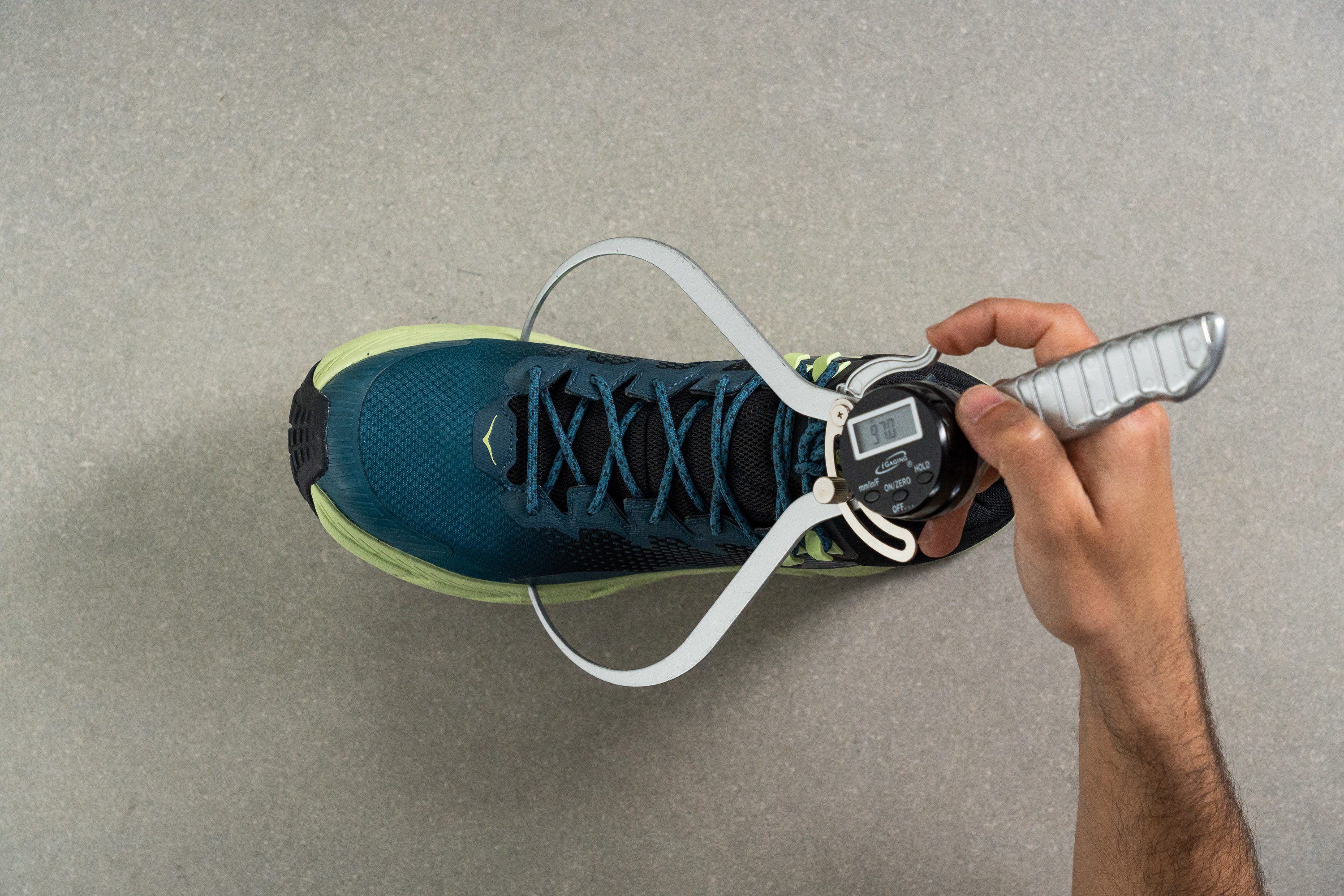
This test follows an older methodology, which is why you don't see recently tested shoes in the chart. Results from different methodologies can not be compared.
| Hoka Trail Code GTX | 97.0 mm |
| Average | 102.1 mm |
Toebox width - big toe
The boot also tapers slightly around the toes. Measuring its width at the big toe, we got a reading of 73.3 mm. That is, again, a couple millimeters narrower than average.
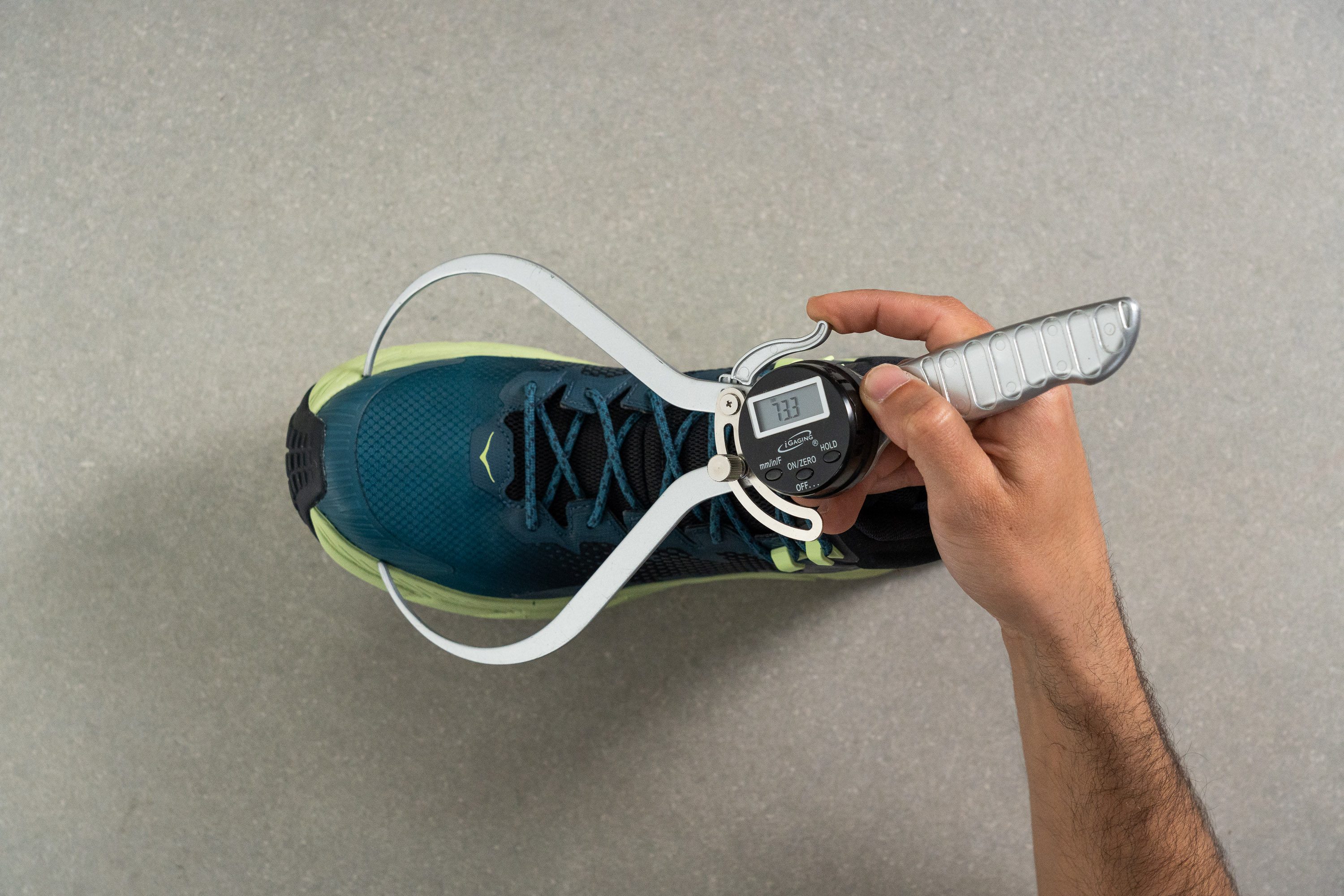
This test follows an older methodology, which is why you don't see recently tested shoes in the chart. Results from different methodologies can not be compared.
| Hoka Trail Code GTX | 73.3 mm |
| Average | 78.6 mm |
Traction / Grip
Lug depth
Based on our calliper measurement, the lugs on this Hoka boot are a little toothier than average - 4.7 mm.
The lugs are strategically spaced-out and bite various terrain really well. Loose trails, wet rocks, mud - whatever scenario a waterproof hiking boot could possibly get into.
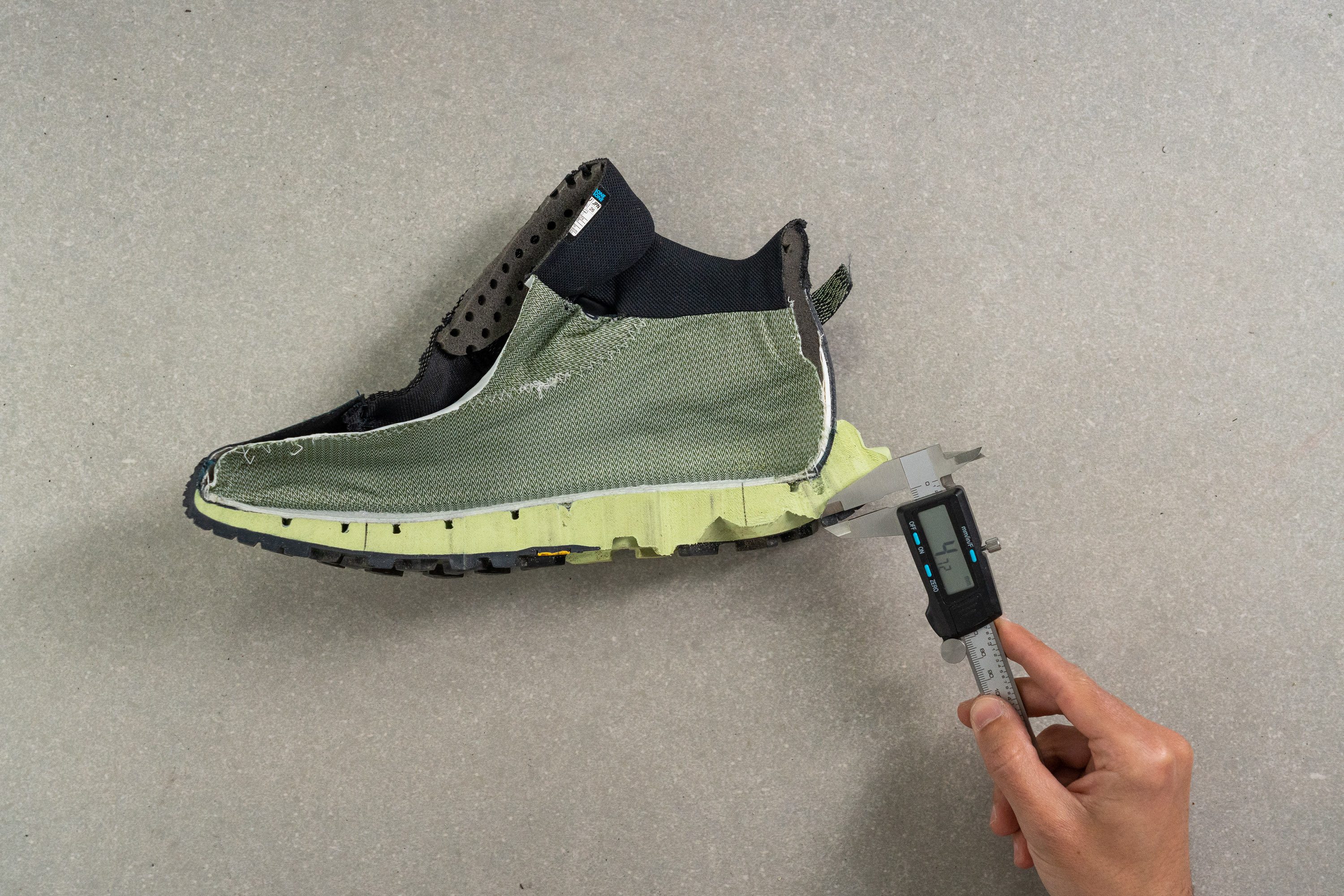
| Hoka Trail Code GTX | 4.7 mm |
| Average | 4.3 mm |
Flexibility / Stiffness
Pretty cool to see that the Hoka Trail Code GTX still has some good flex to it!
Bending the boot to a 30-degree angle in our flexibility testing machine required less force than average. At 18.4N, it takes about as much as hiking shoes do.
That's another characteristic of this Hoka boot that makes it feel more like a sneaker.
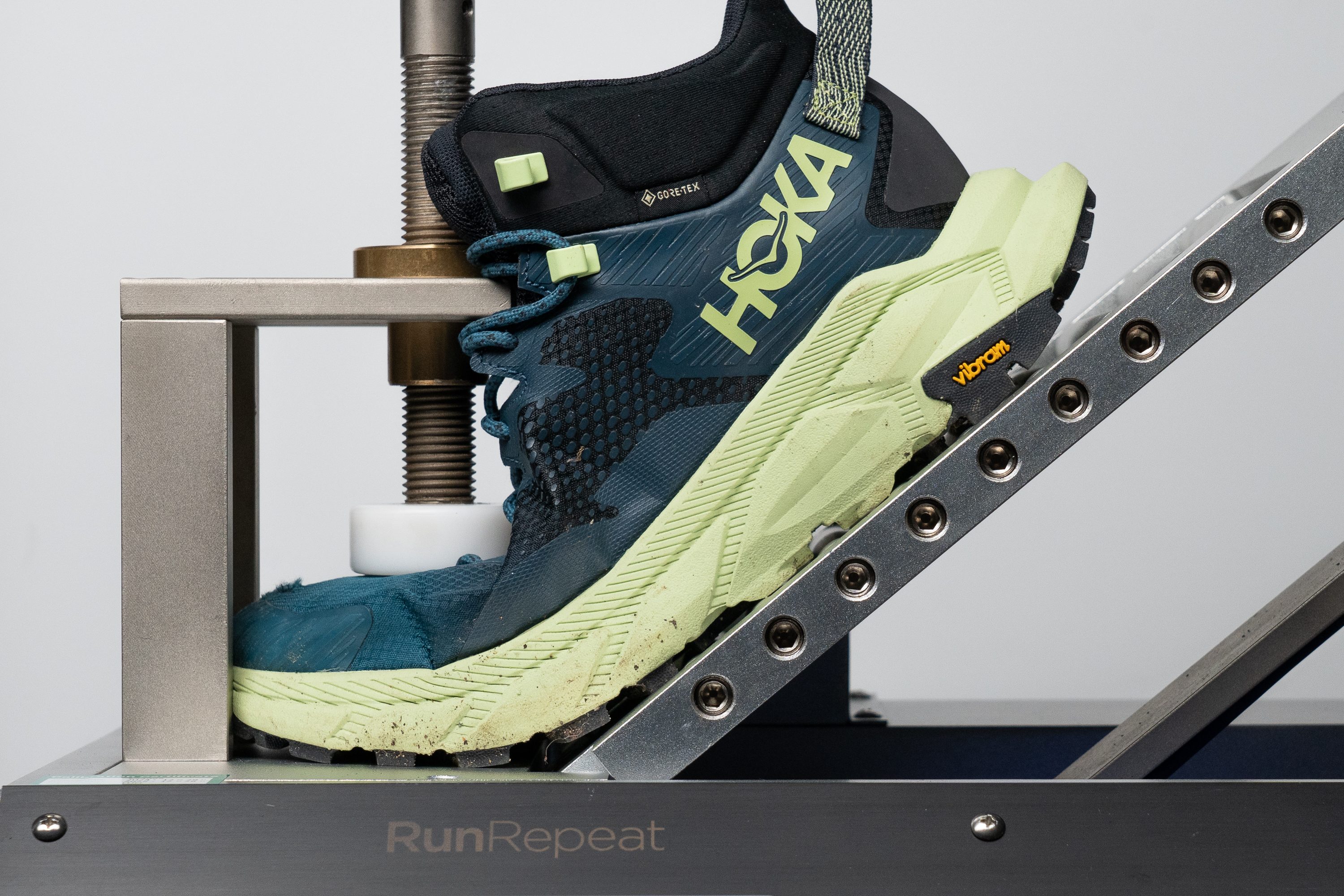
| Hoka Trail Code GTX | 18.4N |
| Average | 31.5N |
Stiffness in cold (%)
But the caveat is that the boot gets significantly stiffer in low temperatures.
After 20 minutes in the freezer, the force gauge showed 44.6N. But then again, for most hiking boots, that's the regular stiffness they have at room temperature.
For reference, the Hoka Trail Code GTX stiffened up by as much as 70.9%!
| Hoka Trail Code GTX | 71% |
| Average | 24% |
Weight
The highlight of this Hoka boot is its light weight.
The Trail Code GTX comes in at 15.5 oz (440g) which is about 20% lighter than the average weight of our lab-tested hiking boots!
On the trail, it feels more like a running shoe with a high-top collar and added protection.
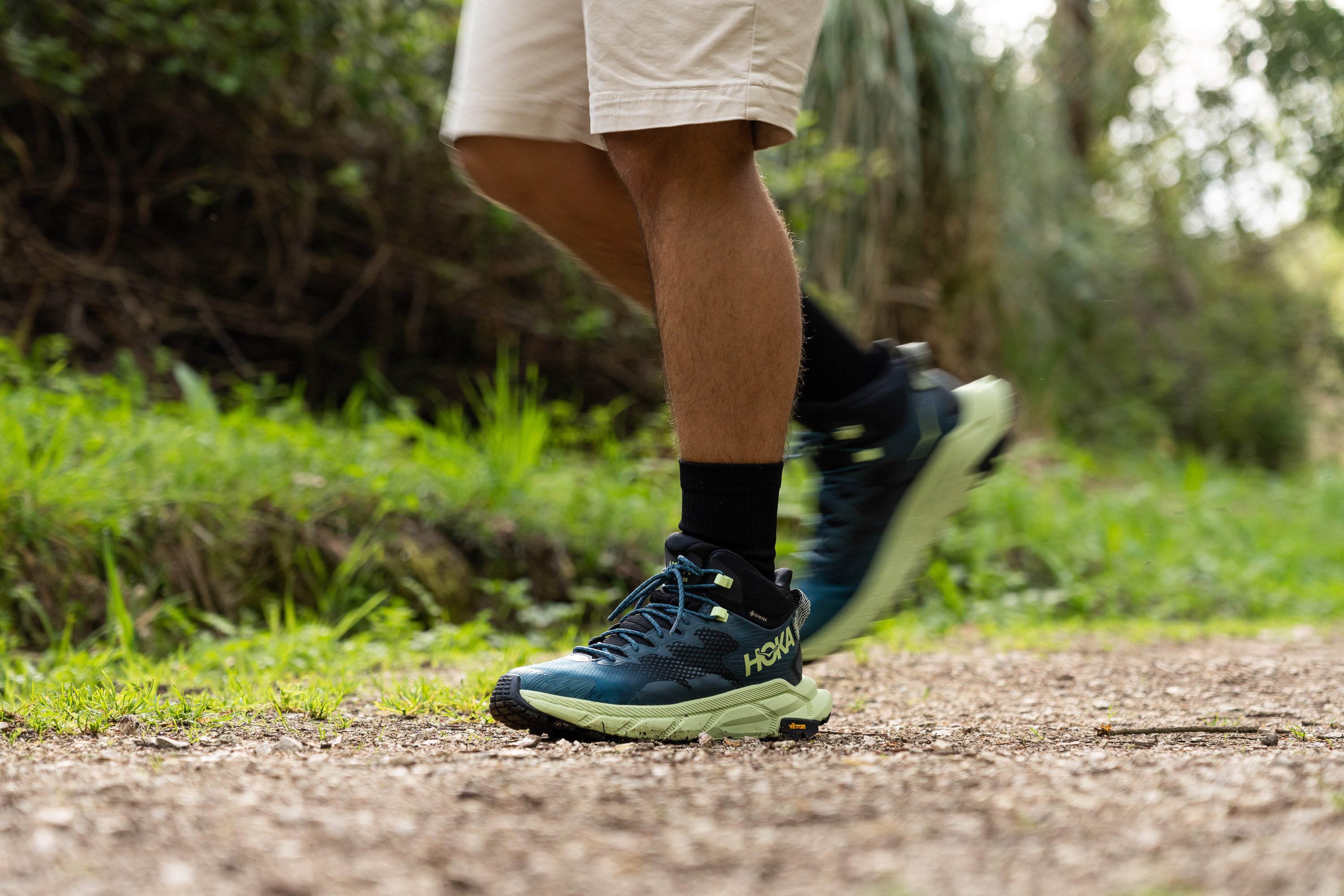
| Hoka Trail Code GTX | 15.5 oz (440g) |
| Average | 18.7 oz (531g) |
Breathability
The Hoka Trail Code GTX is 100% watertight! Hiking in wet conditions is not a problem for this Hoka boot at all.
In the video below, we perform a smoke-pumping machine test to see if the smoke passes through the material. As you can see, not even a tiny streak of vapour is coming out of the Trail Code. That's why it gets the lowest score for breathability - 1 out of 5.
We recommend this boot for colder months as it is going to get pretty toasty in summer. You can see from our microscope shots that the toebox material is super tightly woven.
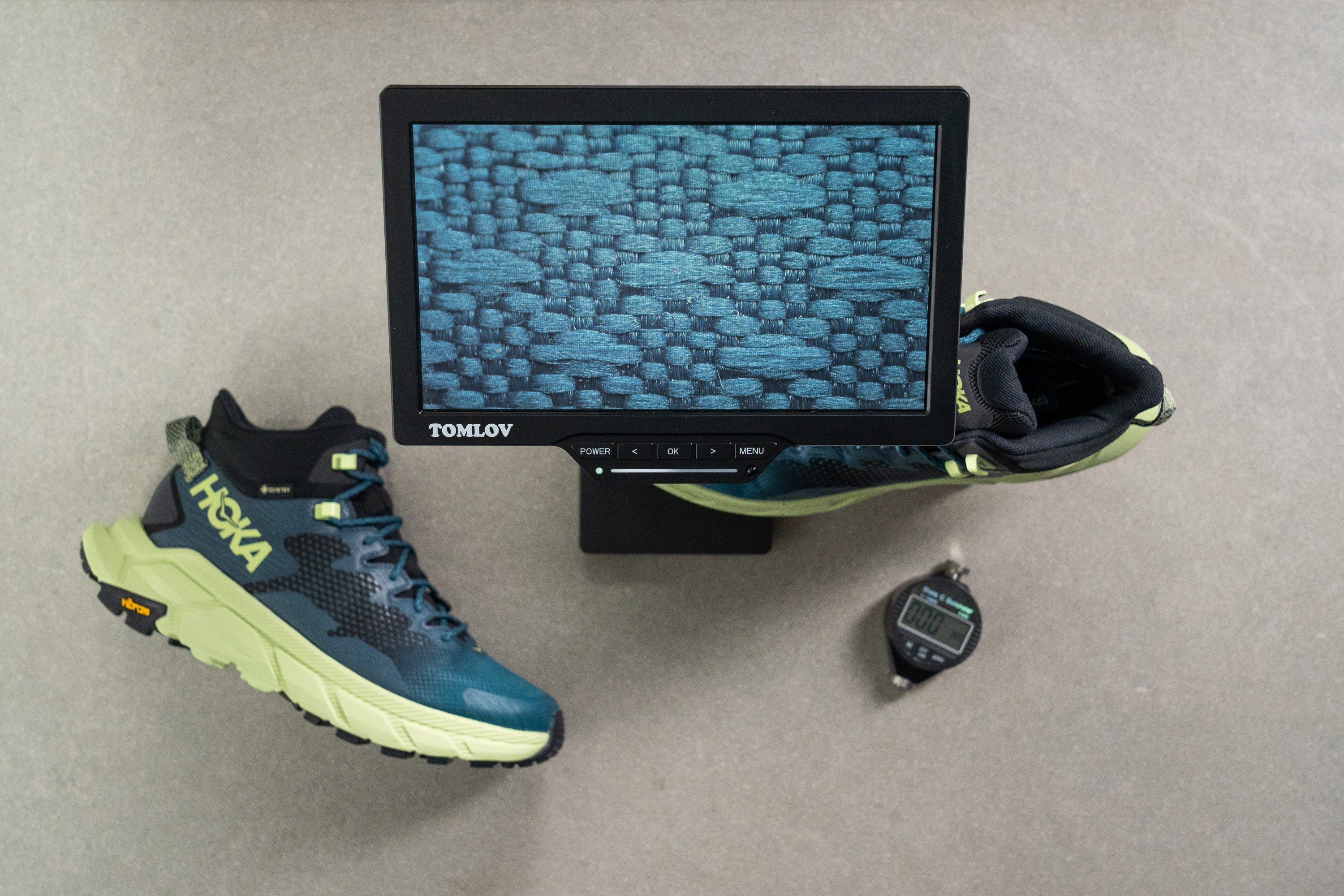
In addition to the waterproof Gore-Tex lining, the upper fabric itself is a water-resistant one.

With the boot's tall heel collar, the waterproof membrane also extends higher up the ankle. This makes the Trail Code GTX more effective for deep puddles and stream crossings.
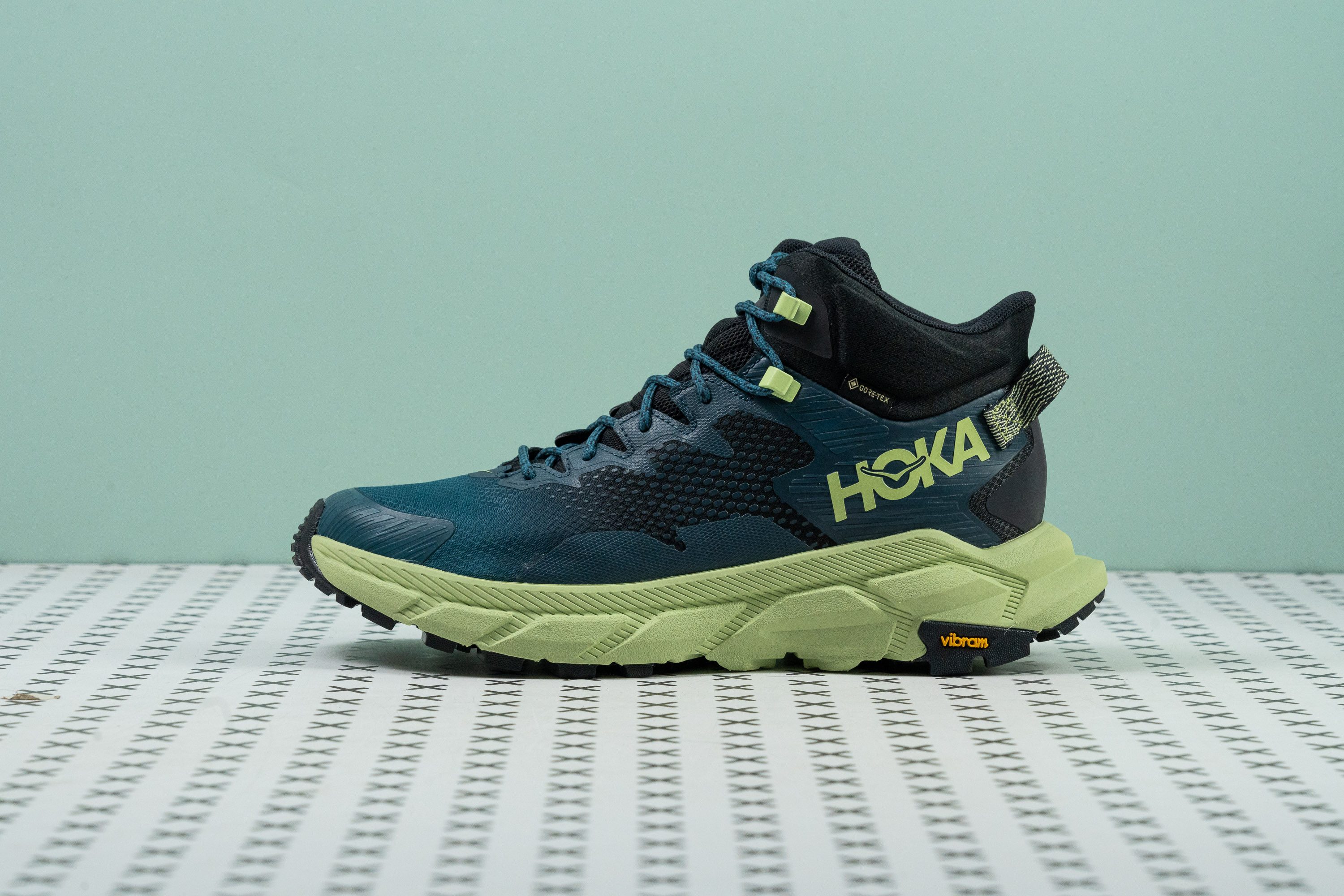
| Hoka Trail Code GTX | 1 |
| Average | 1.3 |
Stability
Lateral stability test
The Trail Code GTX is not a sturdy leather boot, but it supports like one!
There is plenty of stability from the ankle cuff all the way to the bottom of the sole. This Hoka boot made us feel very surefooted and we could even recommend it for moderate backpacking trips.
Torsional rigidity
Despite the plush midsole, this Hoka boot has enough structure to keep the foot steady at all times.
Assessing its torsional rigidity in a manual test, we gave it a rating of 4 out of 5. It's nearly the stiffest!
| Hoka Trail Code GTX | 4 |
| Average | 4.4 |
Heel counter stiffness
The Trail Code GTX also comes with a super stiff heel counter. It makes your heel and ankle feel like they are locked in a death trap (in a good way!). No awkward slipping or sliding of the heel in this boot.
On a 1-5- scale, where 5 is the stiffest possible, we rated it as 5/5.
| Hoka Trail Code GTX | 5 |
| Average | 3.6 |
Midsole width - forefoot
The Hoka Trail Code GTX tops it all off with a reasonably-sized platform. Nothing crazy, just an average-width landing surface for a hiking boot.
We measured the widest part of the forefoot at 112.5 mm, which is right at the average.
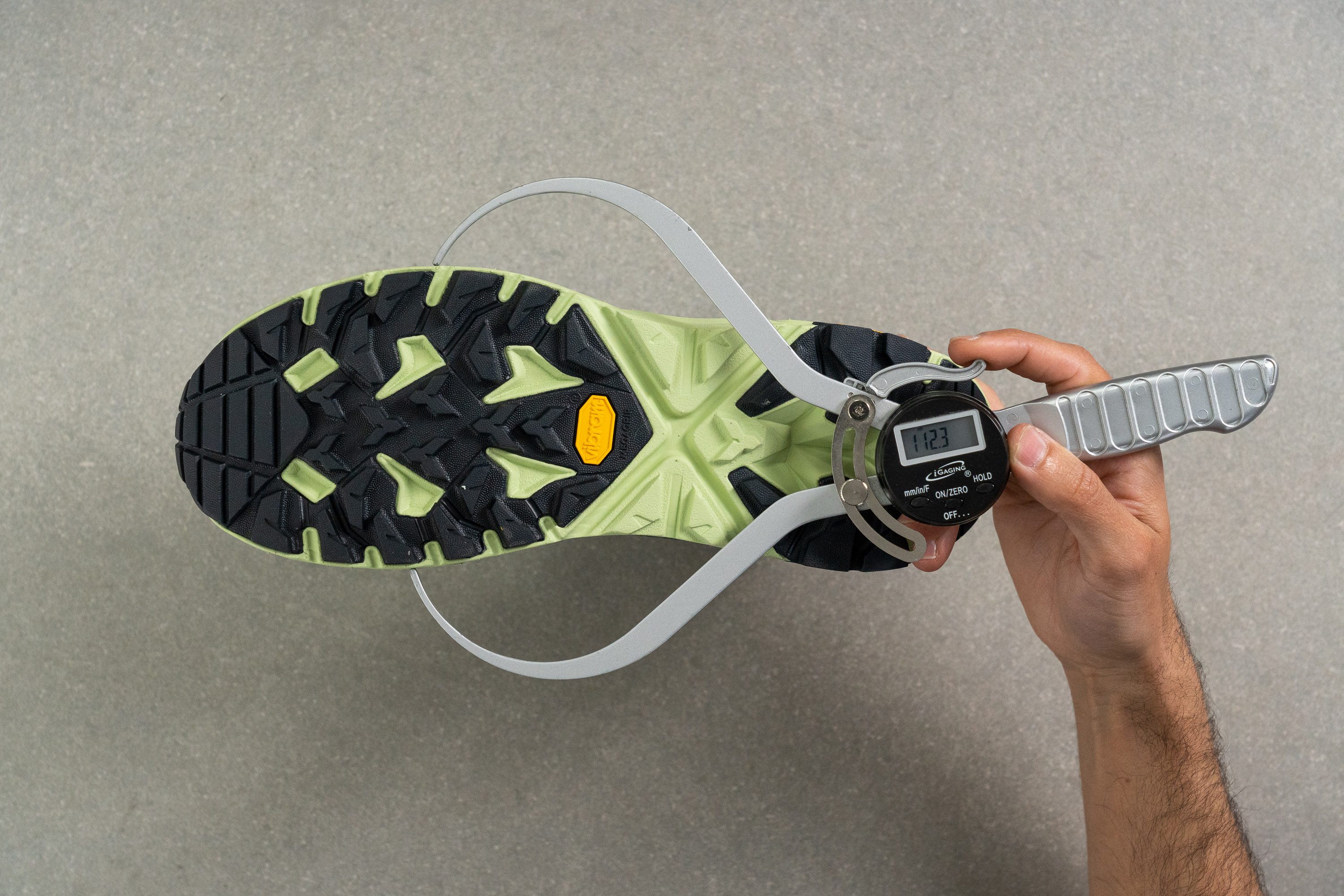
| Hoka Trail Code GTX | 112.5 mm |
| Average | 111.5 mm |
Midsole width - heel
Same thing in the heel. Our calliper shows 91.7 mm in the widest part.
That's just enough for a regular day hike. But for anything more serious, you will need a wider base.
If you do plan to purchase a Hoka boot for backpacking (35+ pounds), we definitely recommend the Hoka Kaha GTX instead.
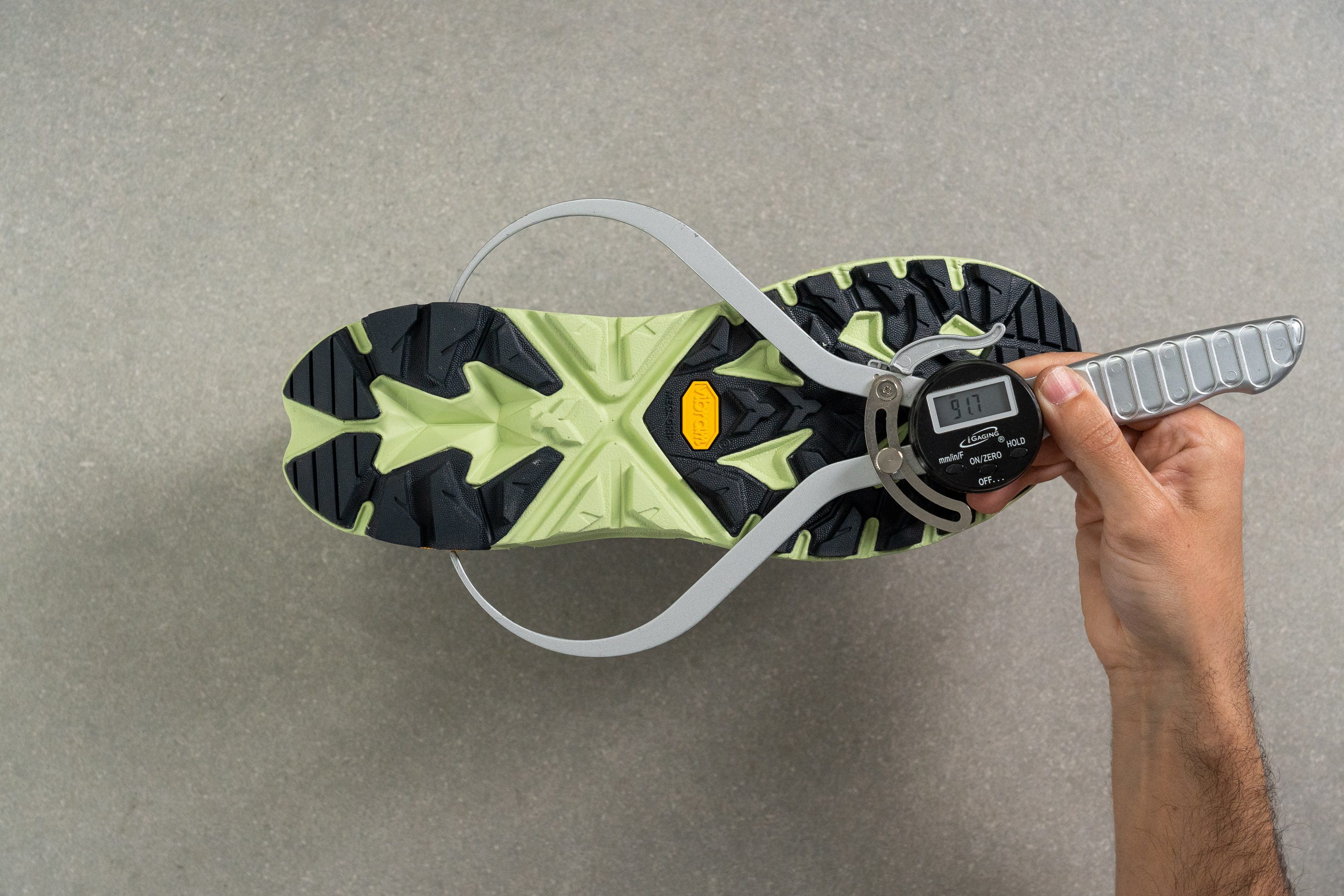
| Hoka Trail Code GTX | 91.7 mm |
| Average | 87.6 mm |
Durability
Outsole hardness
It seems like the Trail Code GTX uses the same Vibram rubber outsole as in the Hoka Anacapa Mid GTX.
This rubber compound is quite hard with a durometer measurement of 86.6 HC. That is a direct indication of its abrasion resistance. It takes much longer to wear out a hard rubber outsole.
However, the areas with exposed foam make us a bit concerned with the boot's durability long-term. It does help to keep the weight down but is not as sturdy as a full-length outsole (like that on the Salomon X Ultra 4 Mid GTX).
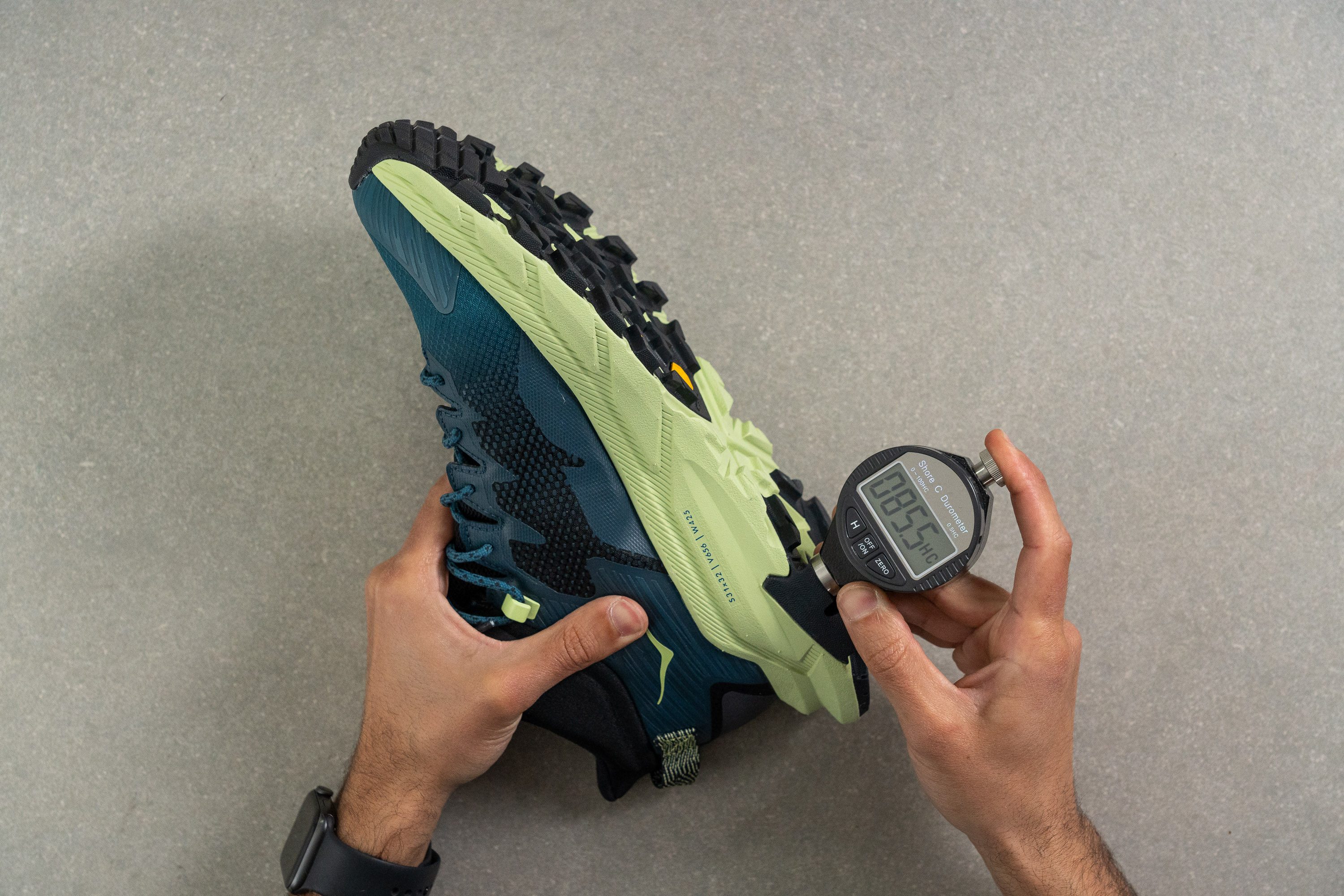
| Hoka Trail Code GTX | 86.6 HC |
| Average | 87.1 HC |
Outsole thickness
Measuring the thickness of that outsole with a calliper, we got 1.8 mm (excluding the 4.7-mm lugs). That is a millimetre less than average. While not critical, it is another tiny indication that this boot may not be ideal for the most demanding hikes.
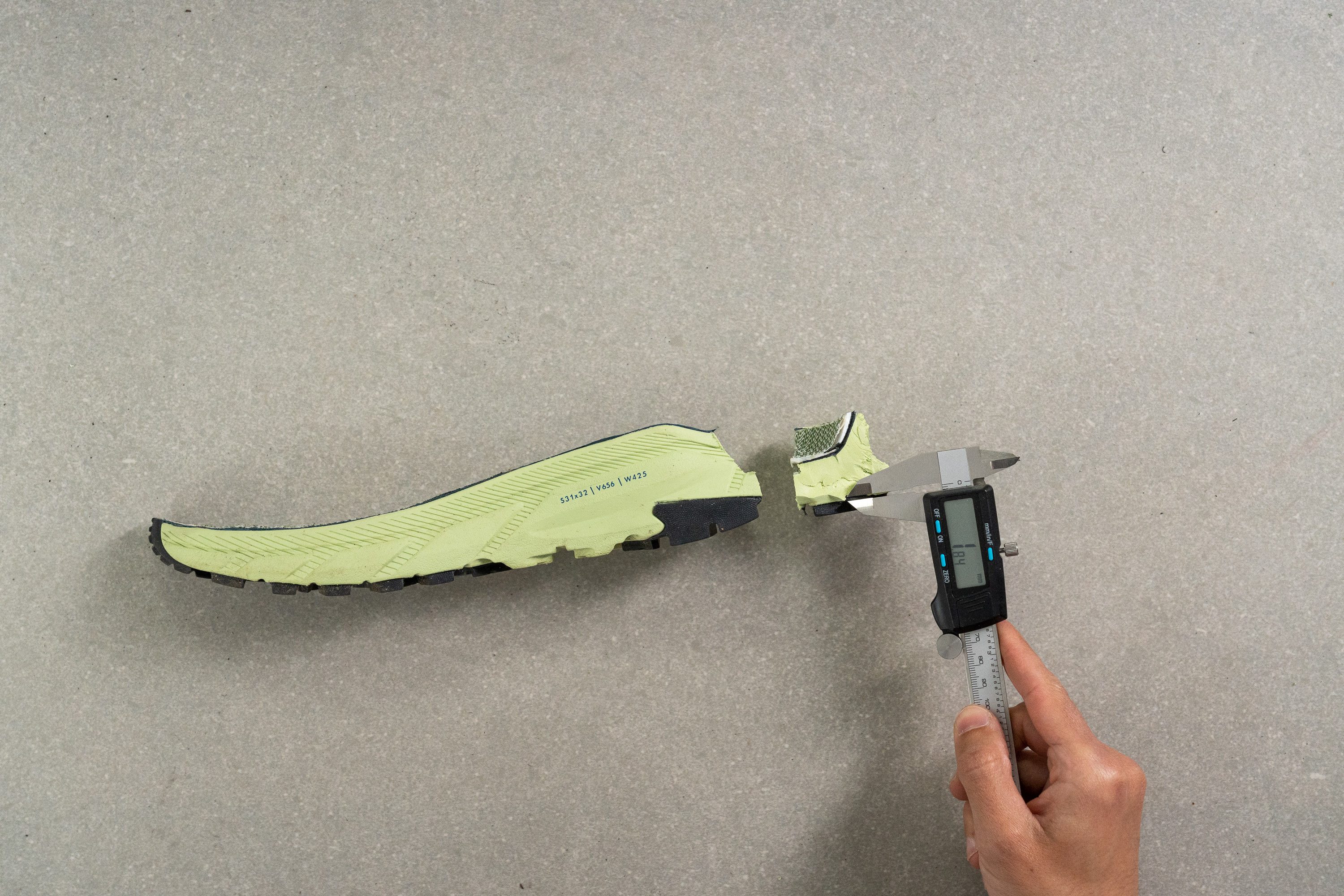
| Hoka Trail Code GTX | 1.8 mm |
| Average | 2.9 mm |
Misc
Insole thickness
A padded insole complements the boot's cushioning. It has an average thickness of 6 mm.
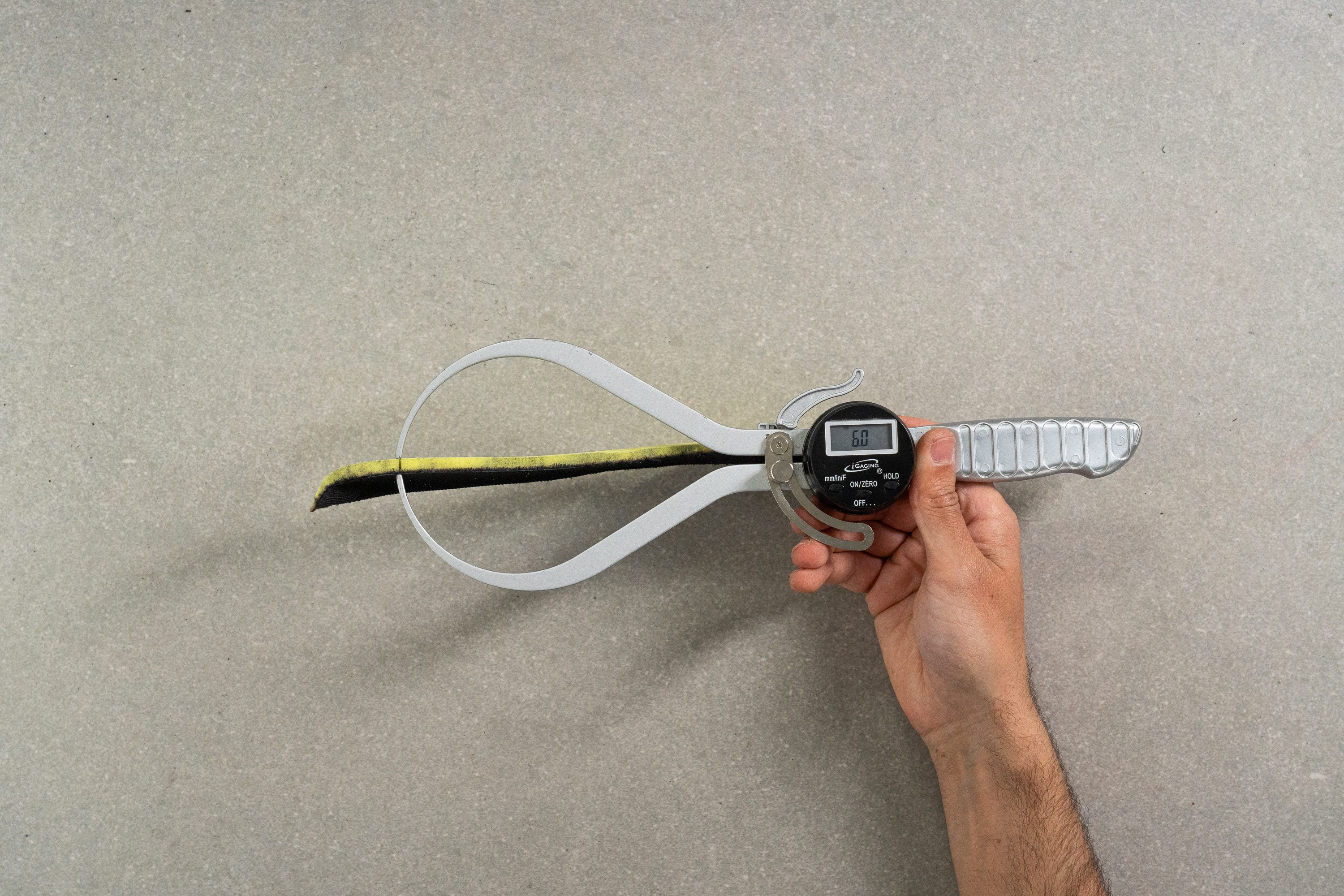
| Hoka Trail Code GTX | 6.0 mm |
| Average | 6.0 mm |
Removable insole
If you need to use custom orthotics with the boot, it is not a problem at all. The default insole is easily removable.
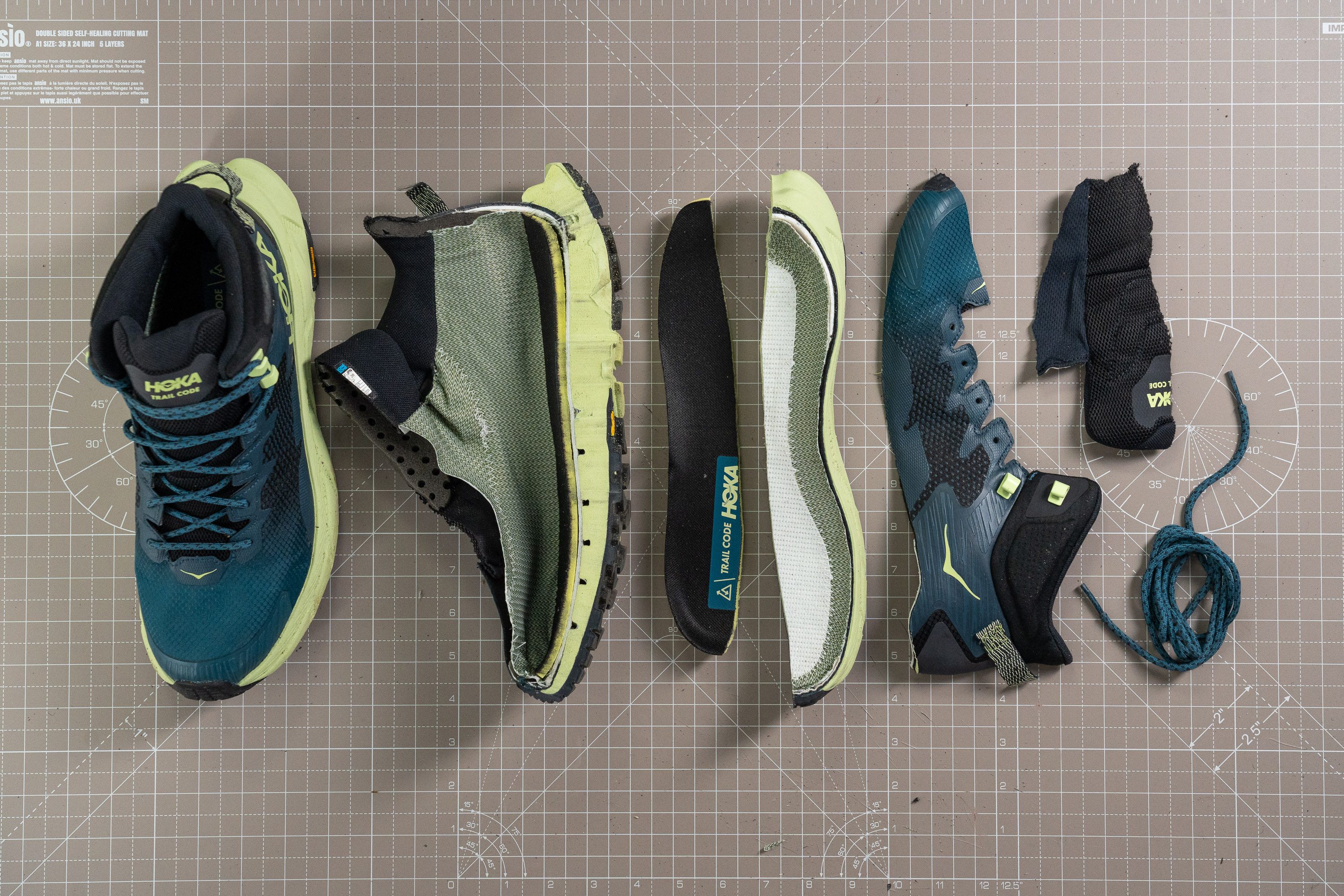
| Hoka Trail Code GTX | Yes |
Midsole softness in cold (%)
But what about winter conditions? Will this Hoka boot remain as plush?
After keeping the boot in the freezer for 20 minutes, we can say "no." But here is the kicker - in its "frozen" state, this Hoka boot only gets as firm as the other hiking boots get on average, which is 28.3 HA.
Even though it's not considered push, it is not brick-like either.
Repeating the durometer measurement after the freezer, we found that the Hoka Trail Code GTX got firmer by 20.9%. That's a little less than the average difference across the board.
| Hoka Trail Code GTX | 21% |
| Average | 20% |
Reflective elements
The Hoka Trail Code GTX features reflective panels at the front and back to help you stay safe in low-light conditions.

| Hoka Trail Code GTX | Yes |
Tongue padding
Measuring the boot's tongue with a calliper, we found it to be 9 mm thick. It is a little less padded than average but still offers plenty of comfort and buffer from the laces
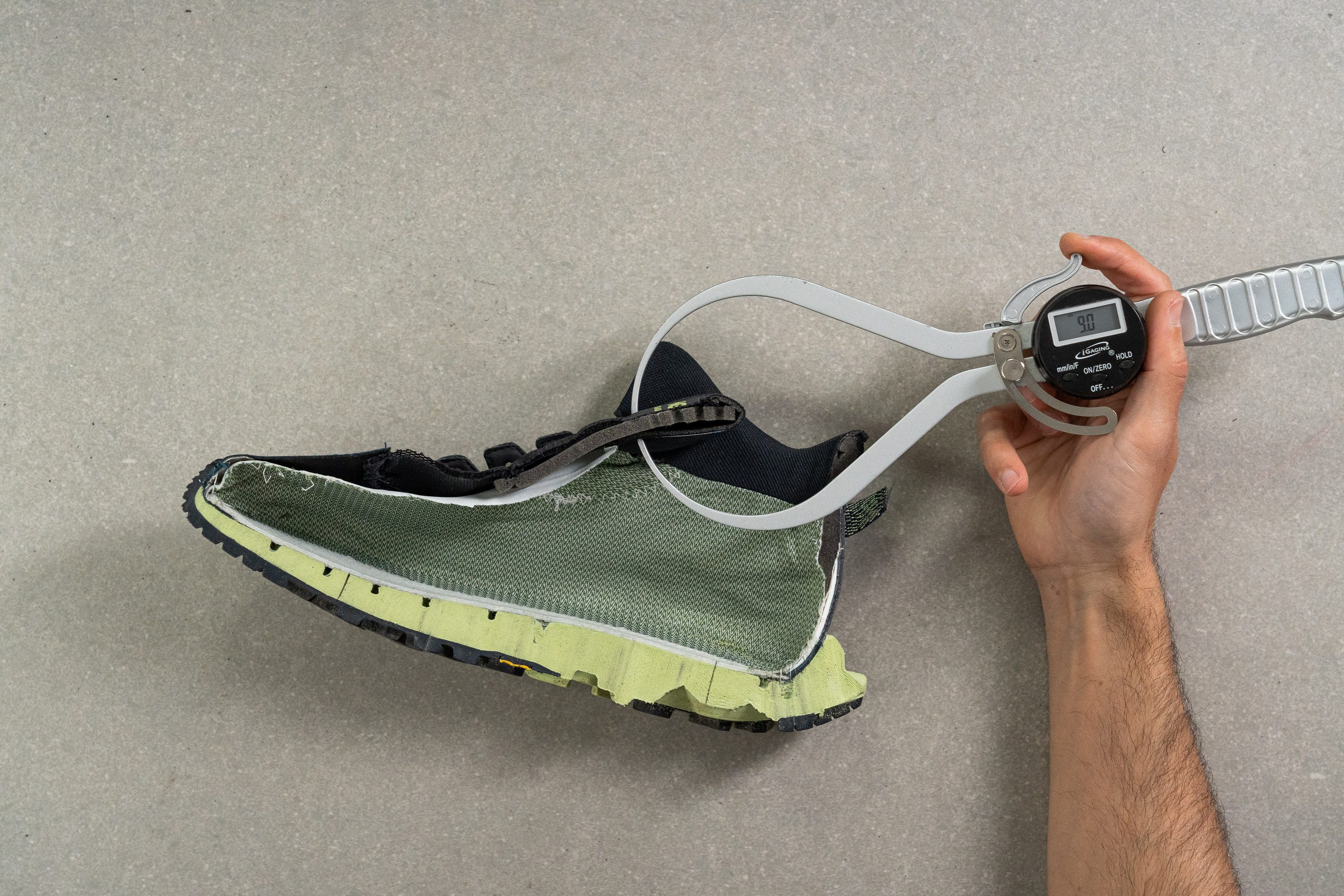
| Hoka Trail Code GTX | 9.0 mm |
| Average | 11.2 mm |
Tongue: gusset type
The Trail Code GTX comes with a fully-gusseted tongue. It makes sure that the boot remains watertight at all times, protects the interiors from small debris, and also helps to secure the foothold.
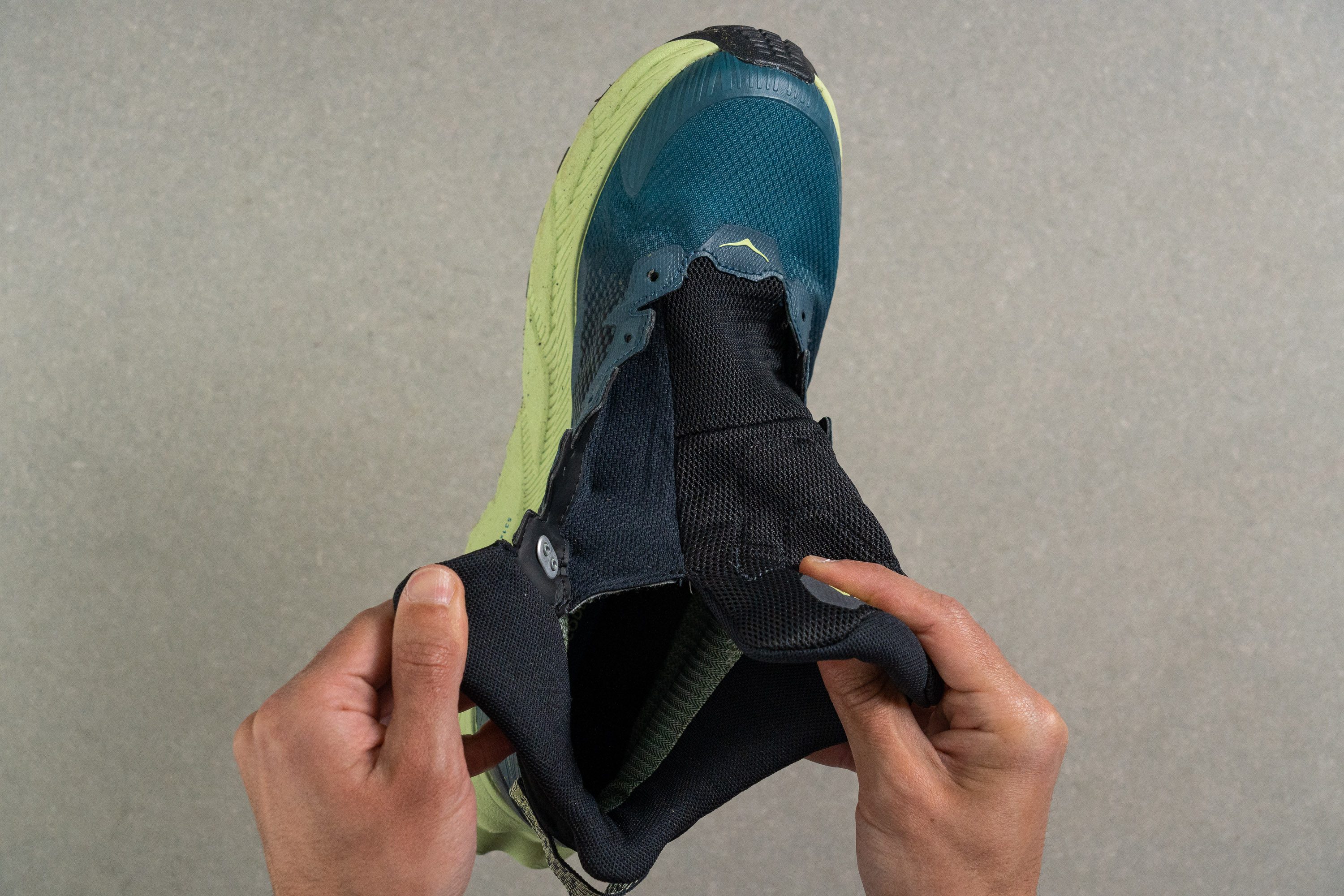
| Hoka Trail Code GTX | Both sides (full) |
Heel tab
The Trail Code GTX would've been incomplete without a finger loop. We found it essential for putting on the boot.
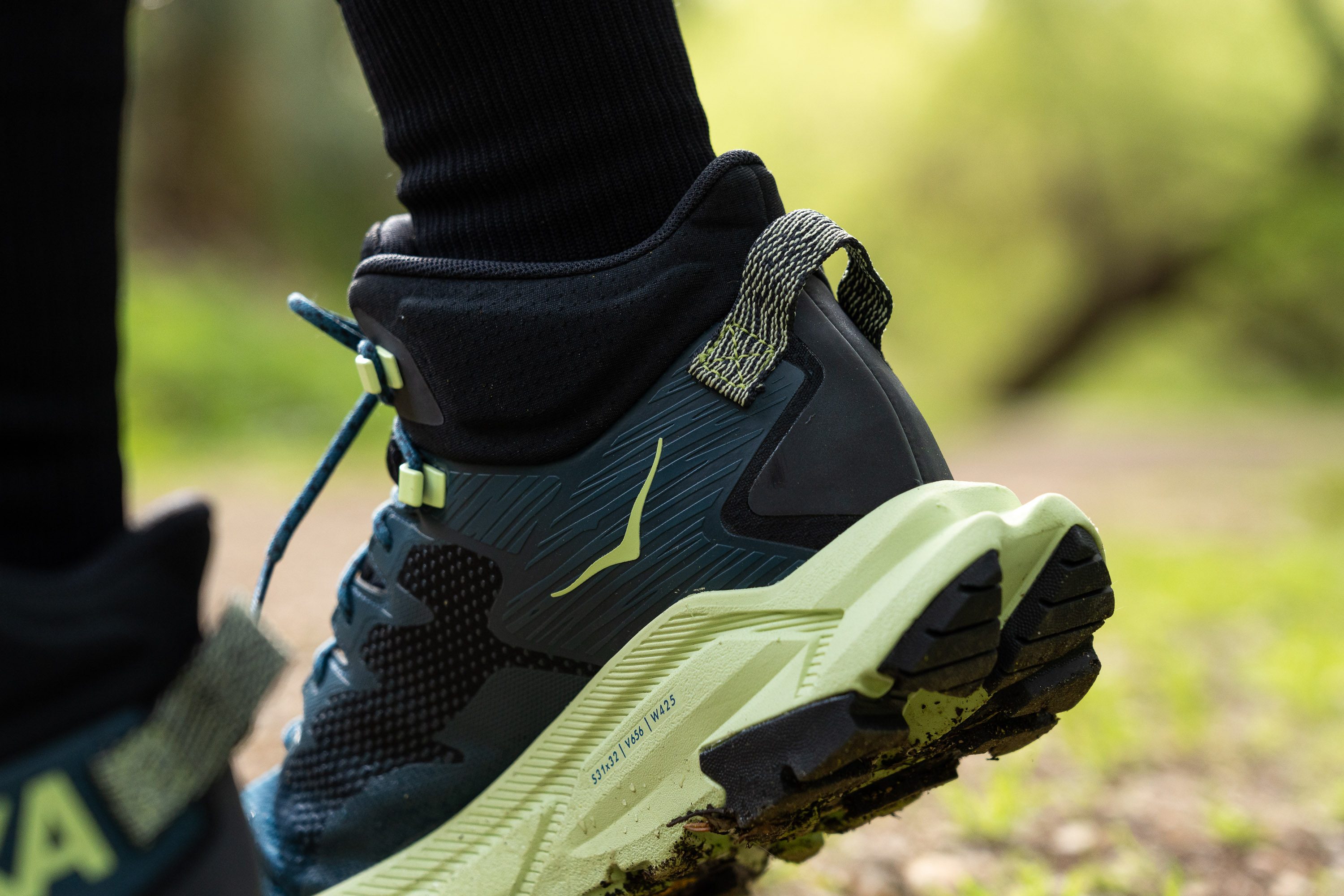
| Hoka Trail Code GTX | Finger loop |
Sustainable materials
Nearly every part of this Hoka boot was made with responsibly-sourced materials.
- Ripstop upper textile, laces, and interior lining: 100% recycled
- Strobel board: 80% recycled
- Gore-Tex membrane: 71% recycled
- External collar mesh: 68% recycled
- Moulded PU sockliner: 50% soybean oil
